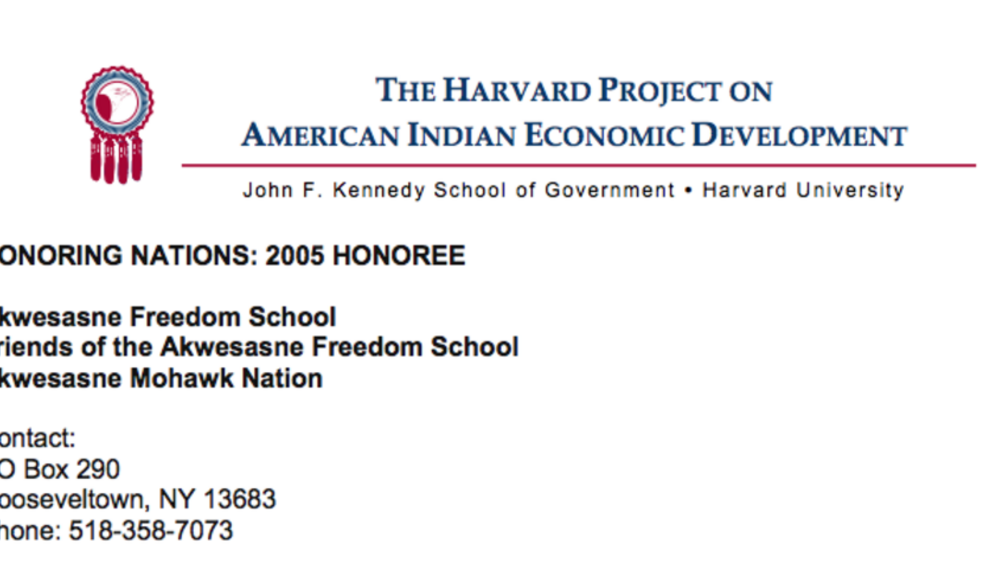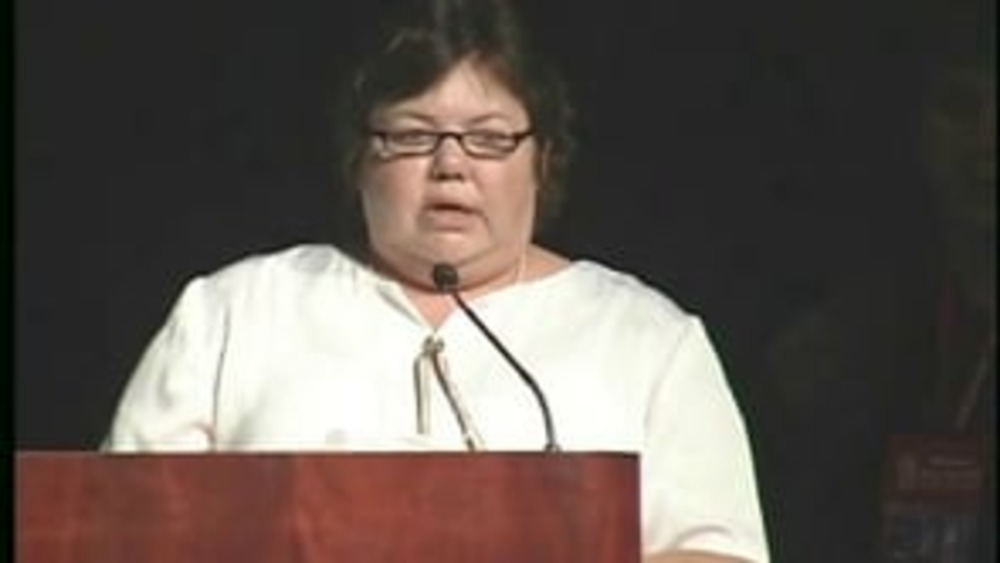Elvera Sargent discusses the Akwesasne Freedom School and the role it plays in the cultural identity of each generation that goes through the curriculum.
Additional Information
Sargent, Elvera. "The Akwesasne Freedom School." Honoring Nations symposium. Harvard Project on American Indian Economic Development, John F. Kennedy School of Government, Harvard University. Cambridge, Massachusetts. September 27-28, 2007. Presentation.
Transcript
Duane Champagne:
"Again, I think that our next program is a similar kind of program, in the sense that it's a grassroots education program, and it's trying to provide us with a solution to how to teach history and culture and identity. I think Akwesasne Freedom School is actually an extraordinary example of that, and so I'll let Elvera Sargent make the presentation."
Elvera Sargent:
"[Mohawk greeting]. I'm a little nervous. I'll let you say [Mohawk greeting]. See, now you know two words in Mohawk [because] I kept hearing the word 'Oweesta,' and that's a Mohawk word, too. My name's Elvera Sargent and I'm from the Mohawk Nation.
I'm here to talk about Akwesasne Freedom School, which [was] founded in 1979. And it [was] founded by parents, who wanted to control what, and how, and who would teach their children. The whole focus of the school is that they immerse their children in the Mohawk language and culture. The students -- we have 75 students this year, and they're ages between 3 and 14. Their studies are based on Ohenton Kariwahtekwen, and you may know that as the Thanksgiving address. Also part of the curriculum of the school is that they attend Long House for ceremonies. And I think all of these things, with the Mohawk language, the culture, I think that really strengthens and gives these students their identity. Then a lot of them don't get into that party mode once they leave our school. Right now, we have four staff people that are graduates of the school. So they've only had four years of high school in the Western, regular public school system. So I think this group of four are very special because they haven't done all the partying and other stuff that all of us did, the rest of us did. So I think that these teachers are our treasures and we need to do everything we can to encourage them, and nurture them, and keep them at the school, so that they can keep teaching and teaching their own children too.
The school's been in existence since 1979, and in that length of time, we've never gone after any federal monies to run the school. The school is very supported by the community. We actually just did our annual dinner and quilt auction. The parents of each child [are] required to donate a quilt as part of their tuition. That quilt auction happened last weekend, and in just that portion, the auction part, they raised $36,000.
We keep our students -- during the last two years of the, while they're at the Freedom School, the students are then taught English so that they can transition into the English public school. Last year we added a Grade 9 class. We only had three students who were in Grade 9 and now, this year, they're in high school in Grade 10. I think we have a unique and special school. The children are taught and cared for as if that child -- each teacher treats each child as if it was their own, and I think that's what is real different. [At] Other schools you don't have kids hugging their teachers, and here it's just a common every day thing to see that.
For the past two years we've had -- our first day of school has become real ceremonial and that's where the child that's coming into the school is introduced to their teacher. And the mom has the opportunity, or the parents have the opportunity, at that time, to inform that teacher what their expectations are and they can also tell what gifts or skills that child has, so that can be nurtured. So we have a lot of singing in the school. We have a lot of games. We teach a lot of traditional activities, such as medicine walks. A lot of our students know how to identify medicines. They know how to run a social in a Long House. That's just an example of some of the things that they do.
Since winning the [Honoring Nations] award in [2005], which I want to say thank you again for that -- I've left the school actually, in November 2006. I just needed to take a break and do something else for awhile. Like I said, they added the Grade 9 class. So this year that Grade 9 class is still going. We have many -- part of our success, I think, comes from the partnerships that we have with community organizations such as the Akwesasne Task Force on the Environment. We partnered with them for three years, and they had funded, and they paid for a cultural educator. And that cultural educator really got into the ceremonies of the Long House, and he was teaching them how to conduct ceremonies and all the wording that goes with each ceremony. I'm sure you all know that in your -- when you don't use your language you're going to lose it. Like this man -- I forget what man was talking about the walleye. I'm sure if they're not using those words in their walleye fishing, they're losing a lot of their words. So that partnership worked out really well. But unfortunately, this year they ran out of funding and there wasn't funding to continue it. But I'm hoping that we'll find other funding so that we can keep this particular person working at the school.
Funding again is always a major issue. We're always looking for funding. Last year, or this past year, we got a little bit of funding from the tribal council and I'm hoping that they're going to give more, more and more on an annual basis, instead of occasionally. We get some funding from the Canadian Board of Education. Again, they've cut a lot this year. So we have to, again, find new funding for that. I don't really worry about that part because I think, regardless if the funding is there, I think the school will continue because people realize the importance and they realize the importance of our language, our culture, giving us our identity. That's it."


